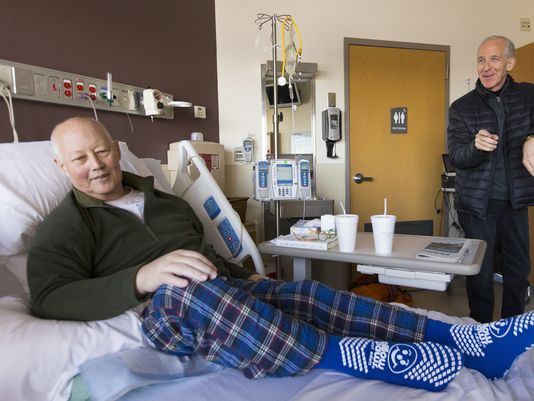Death with dignity advocate Bruce Wilson, facing his end, wants you to know he’s grateful

By
[N]ot long after he wrote that, Bruce became a hospice care physician. He has dedicated himself to nudging, sometimes dragging, his medical colleagues in particular and the public in general to stop, take a deep breath and talk about how we would like to handle our inevitable demise.
Last February, Bruce was diagnosed with pancreatic cancer.
In the months that followed, the disease proved to be indifferent to chemotherapy and beyond surgical intervention.
Bruce, 66, is home with Barb, his wife of almost 34 years. If all goes as hoped, that is where he will die.
“People say to me, ‘This must be so surreal,’” he said during a recent week of in-patient treatment at Froedtert Hospital.
(Bruce is not opposed to end-of-life medical intervention. Doctors, he says, have a very important part to play in improving the quality of their patients’ final days. What he is opposed to are ill-informed medical decisions based on fear and desperation that too often merely extend a dying person’s misery.)
“And you know, it is sort of odd. I’m sitting in the front row watching myself. It’s afforded me the opportunity to be right square in the middle of it and say, ‘OK. How am I going to react to this reality?’ ”
Bruce, in these final days, has plenty to say about death and dying, but here’s the main thing he wants people to know:
“I am so grateful.”
He’s grateful that he has had time to love, to admire, to grieve, to celebrate, to forgive and to be forgiven by the people he cares about most.
“You can’t have that when you have the symptoms of a very aggressive cancer, and you are being eaten alive from the inside and you’re in horrible pain all the time and you develop delirium.
“That opportunity is lost.”
To make the most of the opportunity you are given, Bruce said, you need to prepare.
An advance directive needs to be in place so that your doctors and family don’t have to guess at what you wish will happen as you die.
“So you can mourn together, share the loss together, but also be grateful together for your presence in each other’s life.”
Barb, who was sitting near Bruce’s hospital bed, said, “The thing you need to understand to really see what this gratitude thing does is — there is a kind of ripple effect.”
Sharing gratitude, Barb said, “is such a gift.”
“I don’t have to mourn that he was so miserable, he was so afraid, he didn’t get what he needed, he was so unhappy, he was suffering or in pain.”
It’s the difference between grief and regret.
But here is the hard part, Barb said. Here is what you must do before the time comes, as surely it will, that you can no longer deny that you will die.
You have to live.
“You die how you live,” Barb said.
“And if you have purpose and gratitude and all those things, then that is how you are going to die.”
Complete Article ↪HERE↩!
